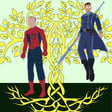
Exploring the Latest in Pop Culture: Daredevil, Sakamoto Days, Split Fiction, and Chainsaw Man!
This episode of Systematic Geekology presents an engaging and insightful discourse on the most recent developments in pop fandom, as our esteemed hosts—Christian Ashley, Herbie Ramsey, and John Erdely—are joined by the esteemed Mark Flower, the host of the "Grub & Grace" podcast. The conversation pivots around the highly anticipated Disney+ series "Daredevil: Born Again," which revives a beloved character while introducing complex themes of justice and morality. Additionally, we delve into the vibrant narrative of the anime "Sakamoto Days," characterized by its unique blend of humor and action, followed by an exploration of the innovative video game "Split Fiction," which cleverly intertwines themes of creativity and collaboration in a virtual reality setting. Our discussion culminates with a deep analysis of the manga series "Chainsaw Man," focusing on its recent revelations that challenge conventional perceptions of fear and power. Join us as we unpack these captivating narratives and their implications within contemporary pop culture.
A comprehensive analysis of the latest episode reveals a profound exploration of themes surrounding identity, morality, and the implications of vigilantism. The episode delves into the intricacies of the narrative, particularly focusing on the character arcs in 'Daredevil: Born Again'. As Matt Murdock grapples with his dual existence as a lawyer and vigilante, the complexities of his psyche are laid bare. The series deftly navigates the moral quagmire of justice versus legality, prompting reflections on societal expectations and the nature of heroism. The juxtaposition of Matt's internal conflicts with the external chaos of New York City serves to heighten the tension and engage the audience in a dialogue about the efficacy of vigilante justice in a flawed system. Key moments within the episode challenge preconceived notions of right and wrong, leaving viewers to ponder the true cost of heroism in a world rife with corruption and moral ambiguity. Overall, this episode stands as a testament to the rich narrative potential of the superhero genre, elevating it beyond mere entertainment to a thought-provoking commentary on the human condition.
In the discussion surrounding 'Sakamoto Days', the episode provides a vivid portrayal of the intersection between humor and action within contemporary manga. The narrative centers on Taro Sakamoto, a retired assassin who, in an ironic twist, seeks a peaceful life devoid of violence. This thematic dichotomy is further enriched by the comedic undertones that permeate the series, as Sakamoto navigates humorous encounters with various assassins trying to claim his life. The episode highlights the unique storytelling style of the manga, characterized by its vibrant art and engaging character dynamics. The juxtaposition of high-stakes action with lighthearted humor not only entertains but also invites the audience to reflect on themes of redemption and the pursuit of a tranquil existence amidst chaos. As Sakamoto's journey unfolds, the narrative cleverly subverts traditional action tropes, presenting a protagonist who embodies the struggle for normalcy in an extraordinary world. This blend of genres resonates deeply, offering insights into the nature of personal transformation and the quest for peace in a tumultuous environment.
The episode culminates with a riveting discussion on 'Chainsaw Man', particularly the revelations concerning the enigmatic 'Death Devil'. As the narrative progresses, the complexities of fear and power dynamics among the various devils are examined in depth. The dialogue reveals how devils embody the fears of humanity, with the 'Death Devil' representing the ultimate existential dread. The implications of this character are explored, particularly in relation to the evolving dynamics between Denji and Asa Mitaka, the new protagonist introduced in the latter part of the series. By weaving in elements of psychological



















